News
I am fully in support of electronic transmission of results – Michael Opeyemi Bamidele
Published
4 years agoon
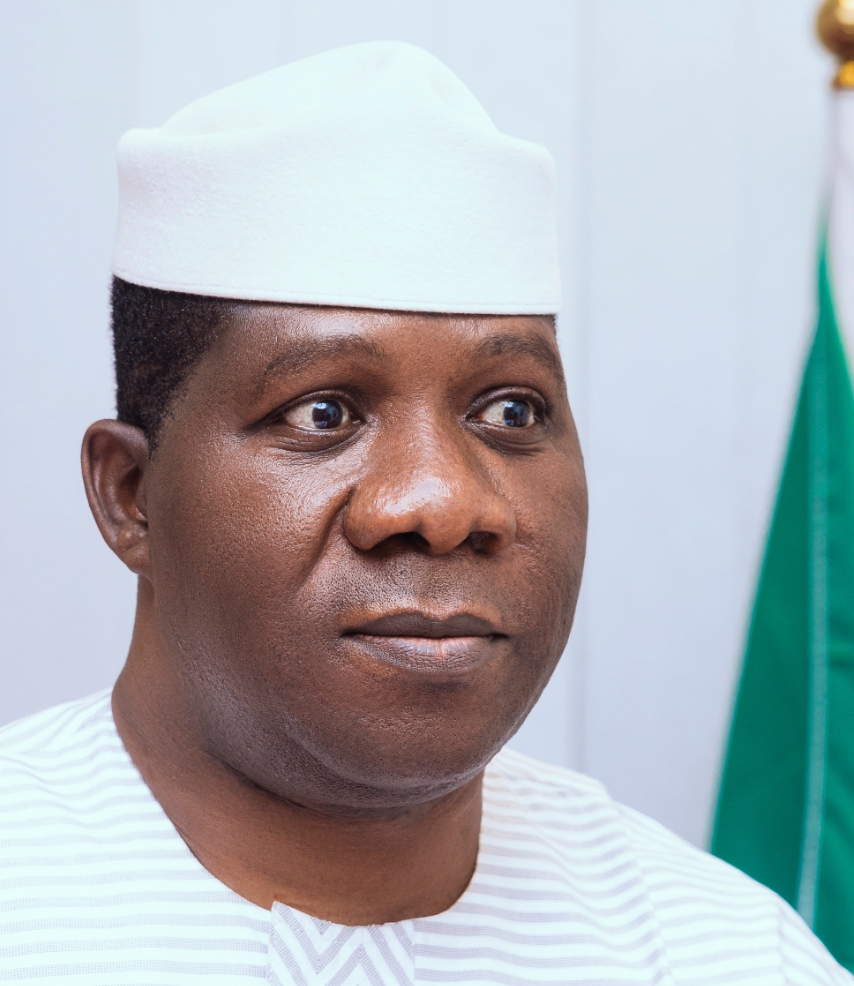
The Chairman Southern Senators Forum and Senate Committee on Judiciary, Human Rights and Legal Matters, Michael Opeyemi Bamidele has said that he never voted against electronic transmission of results by the Independent National Electoral Commission (INEC).
Senator Bamidele explained further that he was one of the few Senators who ensured inclusion of electronic transmission of results in the Electoral Act (Amendment) Bill adding that he has remained consistent in his legislative work in the overriding public interest.
He carpeted some senators from the Peoples Democratic Party (PDP) saying they were grandstanding on the floor of the Senate to run a smear campaign against All Progressives Congress (APC) senators ahead of 2023 general elections.
Bamidele in a state issued gave insights into what transpired in the Senate and expressed concerns over misrepresentations by PDP.
In his words ,“In order that no one who knows me and what I have always stood for would be in doubt as to where I stand, I wish to place on record that I am fully in support of the passage of Section 52(3) of the proposed Electoral Act (Amendment) Bill, which seeks to give the Independent National Electoral Commission (INEC) powers to transmit election results electronically.
“ Let it be known also that I am specifically a member of the Senate Committee on INEC, which, in addition to electronic voting contained in Section 52 (2), recommended and ensured the inclusion of this electronic transmission clause 52 (3) in our Committee report submitted to the Senate for deliberation and passage. The said report, known as the Electoral Act (Amendment) Bill carries both my name and signature.
“We did this in response to the popular desire of a cross section of Nigerians, including stakeholders who participated in our public hearing, as well as in recognition of and compliance with global best practice standard in electoral law and procedure.
“For the records, we had specifically recommended in our report that INEC might electronically transfer election results “where and when practicable.
“As it is the practice in parliamentary procedure, our Committee, which made this recommendation, is, like any other standing committee of the Senate, only a SUB-COMMITTEE OF THE WHOLE once the entire Senate sits to consider the report and clause by clause passage of the proposed Bill.
“At this point, any Senator shall have the right and privilege to propose amendment to any of the clauses proposed in the sub-committee’s report being considered. This was exactly what happened on the floor of the Nigerian Senate on Thursday, 15th July, 2021.
“The Distinguished Senator representing Niger East Senatorial District, Senator Aliyu Sabi Abdullahi, expressed concern that the words ‘electronic transmission of results where and when practicable’, as used in our report, were rather nebulous and could lead to arbitrary intervention and implementation.
intervention and implementation.
Read Also: Electoral Act amendment bans electronic transmission of results
“He also opined that the Nigerian Communication Commission (NCC), being the regulatory institution in charge of communication infrastructure across the country, should be made to work with INEC in determining the “where and when practicable” desire in our report to ensure that Voters in rural communities without access to communication network are not disenfranchised or the results of their elections compromised, relying on a report that only about 43 per cent of the Nigerian rural communities so far have access to communication network service.”
Opeyemi clarified that Senators only disagreed on which versions of the two drafts on electronic transmission of results should be approved.
He added: “This was the issue before the Senate. While every Senator present and voting was in support of electronic transmission of election results (which is a good development for Nigeria), there was a division between the two versions of the draft.
“Distinguished Senator Albert Akpan, representing Akwa Ibom Central Senatorial District, had proposed that the Senate should stick to the recommendation as originally proposed by our sub-committee, as a counter proposal to the amendment sponsored by Senator Aliyu Sabi Abdullahi.
“So, the Senate became divided between those who voted ‘.’YES’ to electronic transmission of results “where and when practicable” and those who voted ‘NO’ to what they described as nebulous version in support of an amendment they believed would ensure that INEC was guided by data and scientific realities.
“The voting and subsequent division was not about making a choice between supporting or rejecting electronic transmission of election results because we all agreed to it.”
He accused some PDP Senators of taking undue advantage of normal parliamentary procedure.
He said: “When the Senate Minority Leader called for a division, we all thought it was a normal parliamentary procedure to ensure accurate result of voting on the floor of parliament.
“But subsequent events and calculated attempts to manipulate facts and misinform the public since then have shown that there was more to it than met the eye as the PDP had taken it beyond their grandstanding on the floor of the Senate to working so hard to run a smear campaign against APC Senators as if their voting ‘no’ was in rejection of electronic transmission of results.
“Of course, 2023 is getting nearer and, expectedly, though unfortunately, PDP is becoming more restless, more aggressive and more determined to manipulate its way back into power. But I think we all should still be mindful of what we do when we are making laws for the people.”
Bamidele said he has been an advocate of electoral reforms as part of his agenda for contesting election to the Senate.
He said: “Electoral reforms constitute a major part of my agenda for contesting election to the Senate because I am convinced on the need to sanitize and stabilize our electoral process so as to stabilize our polity and, by implication, stabilize our economy.
“ I am happy my membership of the Senate Committee is affording me the opportunity to be actively involved in fundamental discussions, engagements, drafting and voting processes aimed at strengthening our democracy. Do I support that INEC be given powers to transmit election results electronically? Absolutely, yes. Did I canvass that position at my Committee level? YES.
“Did the Committee boldly introduce this clause into the draft Electoral Amendment Bill submitted to the Senate for consideration? YES, as it clearly carries my name and signature. Should I have allowed myself to be misguided by the manipulation of those who would not want additional input and reasonable and data driven amendments to our report on the floor of the Senate? NO.
“Am I driven by overriding public interest in my voting on the amendment to our sub-committee version of Section 52 (3) of the proposed Bill? YES.
“Guided by the same overriding public interest that made me endorse a recommendation of our same sub-committee (Senate Committee on INEC) to the same Senate rejecting a Presidential nomination into INEC as National Electoral Commissioner just less than forty eight hours before the voting on Electoral Bill.
“ It is also the same overriding public interest principle which has guided me in sponsoring several Bills and Motions aimed at achieving judicial reforms, social reforms, economic reforms, electoral reforms, youth and women development, deepening diaspora participation in our political process and far reaching constitutional amendment and reforms.”
He assured his supporters and admirers that he has not betrayed the trust reposed in him.
He said: “I am consistently who I am: Michael Opeyemi Bamidele, a product of the collective struggle of the Nigerian youth, students and Pro-Democracy movement. More than most people who grandstand on the floor of the Nigerian parliament today, I, most respectfully, submit that I have more Stakeholders to account to for my actions and inactions, in addition to my Constituents who massively and happily elected me to serve in this capacity.
“ Above all, I am accountable to God Almighty who has saved me to serve and I will faithfully serve Him and humanity to the best of my ability. That is my stand for those who are interested in knowing where I stand on these issues.
“Beyond this, I may not comment any further on this issue as the Senate, as an institution, has an officially appointed Spokesman who would continue to explain the rationale behind every decision of the Senate.
“But let the innocent public beware of political manipulation and let it be known that if an election was to be conducted today and INEC runs into logistic problems in its efforts to electronically transmit results in some remote parts of the country, these same PDP gladiators would be the first to shout that they were being rigged out.
“So, I believe it is important to make NCC submit to INEC for the specific purpose of assisting the electoral umpire in determining the availability of necessary infrastructure and technical capacity to do so long clearly before election.
“If we are wrong on this, let it be the people themselves that will tell us so and if the law is deemed to be invalid, let it be the Judiciary, as the watchdog of democracy, that will shut it down. Not the grandstanding, intimidation or smear campaign of a desperate and self-serving political opposition platform.”
Below is the Statement issued by The Chairman Southern Senators Forum and Senate Committee on Judiciary, Human Rights and Legal Matters, Michael Opeyemi Bamidele.
Press Statement
VOTING ‘NO’: FAR FROM BEING A CHOICE IN REJECTION OF ELECTRONIC TRANSMISSION.
In order that no one who knows me and what I have always stood for would be in doubt as to where I stand, I wish to place on record that I am fully in support of the passage of Section 52( 3) of the proposed Electoral Act (Amendment) Bill, which seeks to give the Independent National Electoral Commission (INEC) powers to transmit election results electronically. Let it be known also that I am specifically a member of the Senate Committee on INEC, which, in addition to electronic voting contained in Section 52 (2), recommended and ensured the inclusion of this electronic transmission clause 52 (3) in our Committee report submitted to the Senate for deliberation and passage. The said report, known as the Electoral Act
(Amendment) Bill carries both my name and signature. We did this in response to the popular desire of a cross section of Nigerians, including Stakeholders who participated in our public hearing, as well as in recognition of and compliance with global best practice standard in electoral law and procedure.
For the records, we had specifically recommended in our report that INEC might electronically transfer election results “where and when practicable.”
As it is the practice in parliamentary procedure, our Committee, which made this recommendation, is, like any other standing committee of the Senate, only a SUB-COMMITTEE OF THE WHOLE once the entire Senate sits to consider the report and clause by clause passage of the proposed Bill. At this point, any Senator shall have the right and privilege to propose amendment to any of the clauses proposed in the sub-committee’s report being considered. This was exactly what happened on the floor of the Nigerian Senate on Thursday, 15th July, 2021.
The Distinguished Senator representing Niger East Senatorial District, Senator Aliyu Sabi Abdullahi, expressed concern that the words ‘electronic transmission of results where and when practicable’, as used in our report, were rather nebulous and could lead to arbitrary intervention and implementation. He also opined that the Nigerian Communication Commission (NCC), being the regulatory institution in charge of communication infrastructure across the country, should be made to work with INEC in determining the “where and when practicable” desire in our report to ensure that Voters in rural communities without access to communication network are not disenfranchised or the results of their elections compromised, relying on a report that only about 43 per cent of the Nigerian rural communities so far have access to communication network service.
This was the issue before the Senate. While every Senator present and voting was in support of electronic transmission of election results (which is a good development for Nigeria), there was a division between the two versions of the draft. Distinguished Senator Albert Akpan, representing Akwa Ibom Central Senatorial District, had proposed that the Senate should stick to the recommendation as originally proposed by our sub-committee, as a counter proposal to the amendment sponsored by Senator Aliyu Sabi Abdullahi. So, the Senate became divided between those who voted ‘.’YES’ to electronic transmission of results “where and when practicable” and those who voted ‘NO’ to what they described as nebulous version in support of an amendment they believed would ensure that INEC was guided by data and scientific realities. The voting and subsequent division was not about making a choice between supporting or rejecting electronic transmission of election results because we all agreed to it.
When the Senate Minority Leader called for a division, we all thought it was a normal parliamentary procedure to ensure accurate result of voting on the floor of parliament. But subsequent events and calculated attempts to manipulate facts and misinform the public since then have shown that there was more to it than met the eye as the PDP had taken it beyond their grandstanding on the floor of the Senate to working so hard to run a smear campaign against APC Senators as if their voting ‘NO’ was in rejection of electronic transmission of results.
Of course, 2023 is getting nearer and, expectedly, though unfortunately, PDP is becoming more restless, more aggressive and more determined to manipulate it’s way back into power. But I think we all should still be mindful of what we do when we are making laws for the people. Electoral reforms constitute a major part of my agenda for contesting election to the Senate because I am convinced on the need to sanitize and stabilise our electoral process so as to stabilise our polity and, by implication, stabilize our economy. I am happy my membership of the Senate Committee is affording me the opportunity to be actively involved in fundamental discussions, engagements, drafting and voting processes aimed at strengthening our democracy. Do I support that INEC be given powers to transmit election results electronically? Absolutely, YES. Did I canvass that position at my Committee level? YES. Did the Committee boldly introduce this clause into the draft Electoral Amendment Bill submitted to the Senate for consideration? YES, as it clearly carries my name and signature. Should I have allowed myself to be misguided by the manipulation of those who would not want additional input and reasonable and data driven amendments to our report on the floor of the Senate? NO. Am I driven by overriding public interest in my voting on the amendment to our sub-committee version of Section 52 (3) of the proposed Bill? YES. Guided by the same overriding public interest that made me endorse a recommendation of our same sub-committee (Senate Committee on INEC) to the same Senate rejecting a Presidential nomination into INEC as National Electoral Commissioner just less than forty eight hours before the voting on Electoral Bill. It is also the same overriding public interest principle which has guided me in sponsoring several Bills and Motions aimed at achieving judicial reforms, social reforms, economic reforms, electoral reforms, youth and women development, deepening diaspora participation in our political process and far reaching constitutional amendment and reforms. I am consistently who I am: Michael Opeyemi Bamidele, a product of the collective struggle of the Nigerian youth, students and Pro-Democracy movement. More than most people who grandstand on the floor of the Nigerian parliament today, I, most respectfully, submit that I have more Stakeholders to account to for my actions and inactions, in addition to my Constituents who massively and happily elected me to serve in this capacity. Above all, I am accountable to God Almighty who has saved me to serve and I will faithfully serve Him and humanity to the best of my ability. That is my stand for those who are interested in knowing where I stand on these issues. Beyond this, I may not comment any further on this issue as the Senate, as an institution, has an officially appointed Spokesman who would continue to explain the rationale behind every decision of the Senate. But let the innocent public beware of political manipulation and let it be known that if an election were to be conducted today and INEC runs into logistic problems in its efforts to electronically transmit results in some remote parts of the country, these same PDP gladiators would be the first to shout that they were being rigged out. So, I believe it is important to make NCC submit to INEC for the specific purpose of assisting the electoral umpire in determining the availability of necessary infrastructure and technical capacity to do so long clearly before election. If we are wrong on this, let it be the people themselves that will tell us so and if the law is deemed to be invalid, let it be the Judiciary, as the watchdog of democracy, that will shut it down. Not the grandstanding, intimidation or smear campaign of a desperate and self serving political opposition platform.
Signed
Senator Michael Opeyemi Bamidele
(Ekiti Central Senatorial District)
Chairman, Senate Committee on Judiciary, Human Rights and Legal Matters; and
Member, Senate Committee on INEC.
You may like
News
Senate Moves to Reshape Legal Profession, Proposes Two-Year Mandatory Pupillage for New Lawyers
Published
3 days agoon
December 3, 2025By
News Editor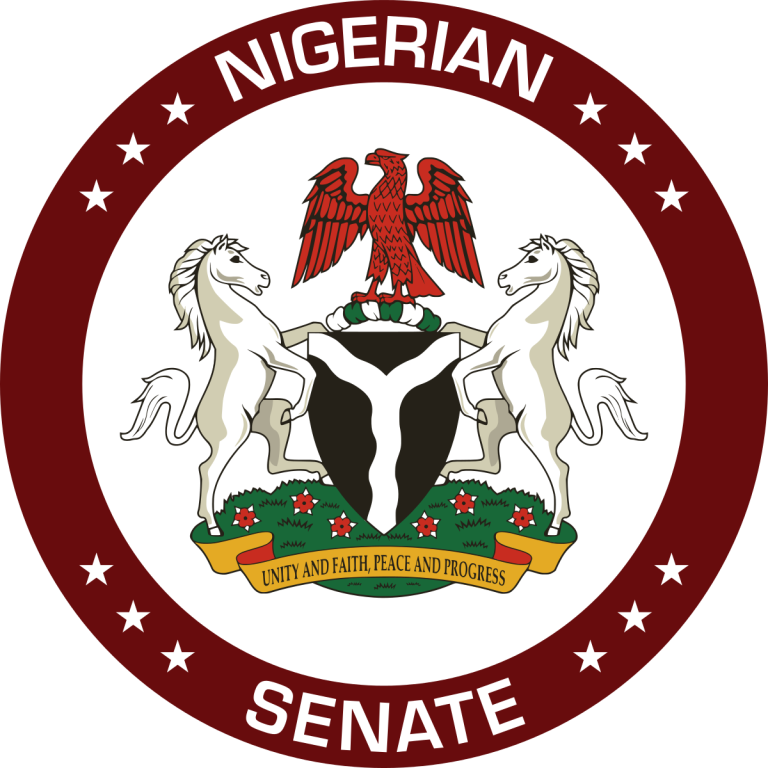
The Nigerian Senate on Wednesday considered sweeping reforms to the legal profession, passing into second reading a bill seeking to amend the Legal Practitioners Act 2004. Central to the proposal is a mandatory two-year pupillage programme for newly called lawyers, designed to align training and regulation with global best practices.
Debating the bill at plenary, lawmakers agreed that the legal system must evolve in response to technological advancement, complex commercial transactions, and growing demands for professional accountability. The bill was sponsored and led by the Leader of the Senate, Senator Opeyemi Bamidele.
According to Bamidele, the current law — nearly six decades old in design — no longer reflects contemporary realities of legal practice. He explained that the reform seeks to modernise oversight structures, strengthen discipline mechanisms, and enhance the quality of service within the profession.
A major highlight of the bill is the restructuring of the Body of Benchers, which, for the first time, will be established as a corporate legal entity with financial autonomy, strengthened secretariat, and defined rule-making authority. The reforms also introduce a clearer institutional framework for committees, oversight, and policy enforcement.
The Senate Leader stressed that the initiative would deliver “a coordinated and well-modernised regulatory framework that addresses admission to the bar, discipline, and professional standards.”
The bill also seeks to fast-track disciplinary processes by reorganising the Legal Practitioners Disciplinary Committee (LPDC). Under the proposed structure, multiple panels would sit across the country while wielding broader sanctioning powers, including suspension, disbarment, restitution, compensation, cost awards, and formal apologies. For transparency, disciplinary outcomes will be published, while affected practitioners will retain the right of appeal to the Supreme Court.
Additionally, the proposal creates a new Ethics, Adherence and Enforcement Committee empowered to inspect law offices, demand records, investigate public complaints, and prosecute cases before the LPDC.
To further boost competence, two years of compulsory pupillage and ongoing professional development will now be requirements for lawyers before full practice certification and licence renewal.
The bill also criminalises unauthorised legal practice, clearly defining the practice of law to protect the public from impersonators and unqualified service providers. Other provisions address the regulation of foreign lawyers, reform of the Senior Advocate of Nigeria rank, and improved safeguards for clients and public trust.
Speaking in support, Chief Whip of the Senate, Senator Tahir Monguno, recalled his experience entering practice over 35 years ago, noting that the realities of the digital age justify reform.
“This bill is very apt and germane,” Monguno said. “We are in the digital age, and our legal profession must reflect these realities.”
The Senate subsequently referred the bill to its Committee on Judiciary, Human Rights and Legal Matters for public hearing and a report within two weeks.
News
Tinubu Approves Nigerian Team for US–Nigeria Joint Security Working Group
Published
1 week agoon
November 27, 2025By
News Editor
President Bola Tinubu has approved the Nigerian contingent of the US–Nigeria Joint Working Group, a new collaborative platform aimed at strengthening security cooperation between both countries.
The decision follows agreements reached during a recent high-level visit to Washington, D.C., led by the National Security Adviser (NSA), Nuhu Ribadu. Ribadu will head the Nigerian side of the Working Group, supported by senior officials drawn from key security and government institutions.
The Nigerian members include Minister of Foreign Affairs, Amb. Yusuf Maitama Tuggar; Minister of Defence, Mohammed Badaru Abubakar; Minister of Interior, Hon. Olubunmi Tunji-Ojo; and the Minister of Humanitarian Affairs, Dr. Bernard M. Doro.
Also on the team are the Chief of Defence Staff, Gen. Olufemi Oluyede; Director-General of the National Intelligence Agency, Amb. Mohammed Mohammed; and the Inspector General of Police, Kayode Egbetokun.
Ms. Idayat Hassan of the Office of the National Security Adviser and Mr. Paul Alabi of the Nigerian Embassy in the United States will serve as the secretariat.
President Tinubu urged the members to work closely with their US counterparts to ensure the effective implementation of all agreements reached across various sectors.
The announcement was made on Wednesday in a statement by Bayo Onanuga, Special Adviser to the President on Information and Strategy.
News
Obasanjo Returns $20,000 Allegedly Given for Fayose’s Birthday Logistics
Published
1 week agoon
November 26, 2025By
News Editor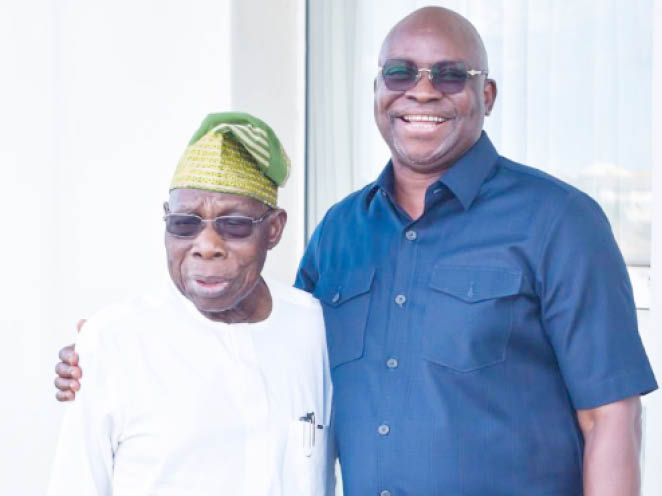
Former President Olusegun Obasanjo has returned the $20,000 allegedly provided to him by former Ekiti State Governor, Ayo Fayose, ahead of Fayose’s 65th birthday celebration, following a fresh disagreement between the two political figures.
Fayose confirmed the development during an interview with AF24 News, where he narrated the sequence of events surrounding the controversy. According to him, preparations for his birthday prompted him to reach out to individuals he had previously fallen out with politically. He noted that this move was aimed at “mending fences,” but stressed that his call to Obasanjo should not be misconstrued as an apology.
The former governor recounted that Obasanjo visited his Lagos residence days before the celebration and expressed willingness to attend the event, despite having a conflicting engagement in Rwanda. Fayose said that during the visit, Obasanjo requested financial support for his travel logistics, prompting him to provide $20,000.
“I changed $20,000 and gave it to him. How can you accept somebody’s money and come and be spiting that person?” Fayose said, expressing disappointment over Obasanjo’s subsequent public remarks.
The matter escalated after Obasanjo stated that he had not opened the money and would return it, comments that Fayose considered disrespectful. In response, Fayose said he sent the former president a strongly worded text message demanding clarity and expressing his displeasure.
Following the exchange, Obasanjo reportedly returned the money.
“I have written to him, and he has returned my $20,000,” Fayose confirmed during the interview. When asked how he felt about the return of the funds, he replied: “I am very happy. I will not allow such a man to carry my money away.”
The clash adds another layer to the long-standing political tension between both men, who have had a history of public disagreements spanning several years.
Latest News
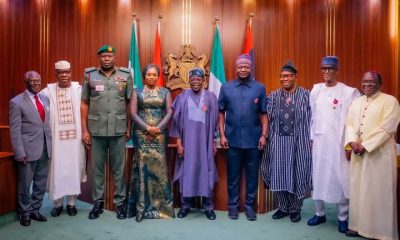

TINUBU SWEARS IN GEN. CHRISTOPHER MUSA AS DEFENCE MINISTER
SharePresident Asiwaju Bola Ahmed Tinubu on Thursday swore in retired General Christopher Gwabin Musa as Nigeria’s Minister of Defence at...


Senate Moves to Reshape Legal Profession, Proposes Two-Year Mandatory Pupillage for New Lawyers
ShareThe Nigerian Senate on Wednesday considered sweeping reforms to the legal profession, passing into second reading a bill seeking to...


Senate Confirms Former Defence Chief Christopher Musa as Minister
ShareThe Senate has confirmed General Christopher Musa (rtd), the immediate past Chief of Defence Staff, as Nigeria’s new Minister of...
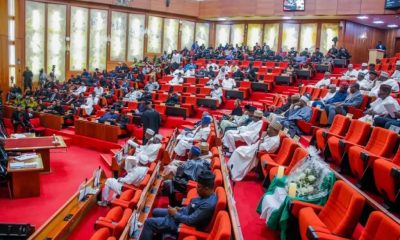

Senate Backs Death Penalty for Kidnapping, Moves to Redefine Crime as Terrorism
ShareIn a decisive move to stem rising insecurity, the Senate has approved key amendments to the 2022 Terrorism (Prevention and...


Senate to Screen Defence Minister Nominee Today
ShareThe Senate will on Wednesday screen the immediate past Chief of Defence Staff, General Christopher Gwabin Musa, as the new...
